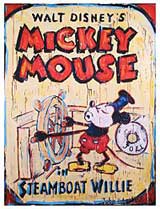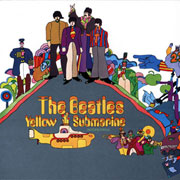影片對白 You've got it all twisted. This here is my home.
文化面面觀
動畫的歷史
 |
| Gertie the Dinosaur |
Animation is a series of still drawings that, when viewed in rapid succession, gives the impression of a moving picture. The word animation derives from the Latin words anima meaning life, and animare meaning to breathe life into. Throughout history, people have employed various techniques to give the impression of moving pictures. Cave drawings depicted animals with their legs overlapping so that they appeared to be running. The properties of animation can be seen in Asian puppet shows, Greek bas-relief, Egyptian funeral paintings, medieval stained glass, and modern comic strips.
In 1640, a Jesuit monk named Althanasius Kircher invented a "magic lantern" that projected enlarged drawings on a wall. A fellow Jesuit, Gaspar Schott, developed this idea further by creating a straight strip of pictures, a sort of early filmstrip, that could be pulled across the lantern's lens. Schott further modified the lantern until it became a revolving disk. A century later, in 1736, a Dutch scientist named Pieter Van Musschenbroek created a series of drawings of windmill vanes that, when projected in rapid succession, gave the illusion of the windmill circling around and around.
 |
| Steamboat Willie |
The magic lantern became a popular form of entertainment. Traveling entertainers, visiting the villages and towns of Europe, included it in their shows. In London, the Swiss-born physician and scholar Peter Mark Roget, most famous for compiling the Thesaurus of English Words and Phrases, was fascinated by the scientific phenomenon at play and wrote an essay entitled "Persistence of Vision with Regard to Moving Objects" that was widely read and used as a basis for subsequent inventions. One of the first was the thaumatrope, developed in the 1820s by John Paris, also an English doctor. The thaumatrope was simply a small disk with a different image drawn on either side. Strings were knotted onto two edges so that the disk could be spun. As the disk twirled around, the two images appeared to blend. For example, a monkey on one side appeared to sit inside the cage on the opposite side.
The next major innovation was the phenakistoscope, created by Joseph Plateau, a Belgian physicist and doctor. Plateau's contribution was a flat disk perforated with evenly spaced slots. Figures were drawn around the edges, depicting successive movements. A stick attached to the back allowed the disk to be held at eye level in front of a mirror. The viewer then spun the disk and watched the reflection of the figures pass through the slits, once again giving the illusion of movement.

|
| Snow White and the Seven Dwarfs |
In Austria, Simon Ritter von Stampfer was toying with the same idea and called his invention a stroboscope. A number of other scopes followed, culminating in the zoetrope, created by William Homer. The zoetrope was a drum-shaped cylinder that was open at the top with slits placed at regularly spaced intervals. A paper strip with a series of drawings could be inserted inside the drum, so that when it was spun the images appeared to move.
By 1845, Baron Franz von Uchatius invented the first movie projector. Images painted on glass were passed in front of the projected light. Forty-three years later, George Eastman introduced celluloid film, a strip of cellulose acetate coated with a light-sensitive emulsion that retained and projected images better than those painted on glass. The first animated cartoon Humorous Phases of Funny Faces by J. Stuart Blackton, of the New York Evening World, was shown in the United States in 1906. Two years later, French animator Emile Cohl followed suit with Phantasmagorie. Winsor McCay introduced Gertie the Dinosaur in 1911. Other cartoonists who brought their characters to the screen included George McManus (Maggie and Jiggs) and Max Fleischer (Betty Boop and Popeye). By 1923,

|
| Yellow Submarine |
Walt Disney, the world's most famous animator, began turning children's stories into animated cartoons. Mickey Mouse was introduced in Steamboat Willie in 1928. Disney's first animated full-length film, Snow White and the Seven Dwarfs, debuted in 1937.
Yellow Submarine, a 1968 animated film starring the Beatles, featured the process of pixilation, in which live people are photographed in stop-motion to give the illusion of humanly-impossible movements. In the film The Lord of the Rings, directed in 1978 by Ralph Bakshi using rotoscoping, live action was filmed first. Then each frame was traced and colored to create a series of animation cels. By the late twentieth century, many in the industry were experimenting with computer technology to create animation. In 1995, John Lassiter directed Toy Story, the first feature film created entirely with computer animation. (answers.com)
考考你
用今日所學將下面的句子譯成英語。
1. 我們不在家的時候鄰居幫我們照看的房子。他們去度假的時候我們也將幫他們照看房子。
2. 另一只隊的粉絲對我們行為萎縮,我們粉絲也等不及要以牙還牙。
3. 一條繪聲繪色的小道消息正在傳來傳去。
4. 你再煩我我就走了。
Open season《叢林大反攻》精講之一 考考你 參考答案
1. 請為我們的明星克魯斯先生鼓掌!
Please put your hands together for our star-Mr. Cruiz.
2. 毫無疑問這個流行歌星會大受歡迎的。
There is no doubt the popular star will rock the house.
3. 員工得乖乖地聽老板的話。
The staff has to eat out of the boss’ hand.
影片對白 You've got it all twisted. This here is my home.
點擊進入:更多精彩電影回顧
(英語點津Annabel編輯)